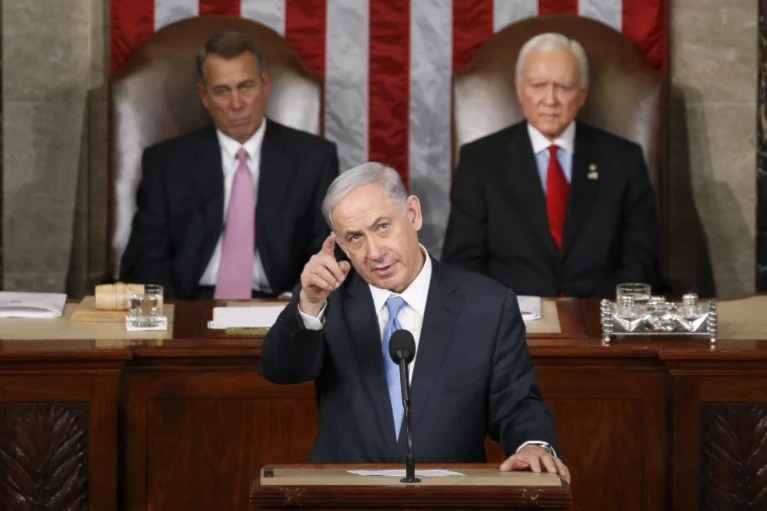Netanyahu's campaign against Iran's nuclear program muted with Trump
Israeli Prime Minister Benjamin Netanyahu has long been on a campaign against Iran's nuclear program, and his opposition helped convince President Trump to withdraw from an Obama-era deal meant to rein it in.
-

Israeli Prime Minister Benjamin Netanyahu gestures while speaking before a joint meeting of Congress on Capitol Hill in Washington, March 3, 2015 (AP Photo/Andrew Harnik)
A decade after denouncing the Iran nuclear deal on the world’s biggest stages, Benjamin Netanyahu has adopted an unusual silence as the United States resumes talks with Iran under the leadership of Donald Trump, Tia Goldberg wrote for the Associated Press.
Netanyahu, who views an Iranian nuclear capability as an existential threat to "Israel", was once a vocal opponent of diplomacy with Tehran. In 2015, he openly criticized the Obama administration's nuclear deal, delivering a high-profile speech before the US Congress without White House coordination.
Today, with Washington once again negotiating with Tehran through indirect nuclear talks reaching their fourth round, Netanyahu has refrained from any open rebuke, mindful not to antagonize a US president he sees as a close ally, Goldberg wrote.
“He can’t do anything that goes against Trump. He's paralyzed,” said Yoel Guzansky, an Iran expert at the INSS think tank in Tel Aviv.
Although "Israel" has made strategic gains over Iran’s regional allies, particularly in Lebanon, Gaza, and Syria, and carried out direct strikes on Iranian assets, Netanyahu has not persuaded Trump to support a military strike on Iran's nuclear infrastructure.
Netanyahu’s preferred deal framework
In a rare public divergence from Trump, Netanyahu called on Sunday for the complete dismantling of Iran's nuclear infrastructure, rejecting any deal that allows Tehran to continue enriching uranium.
"I said to President Trump that I hope that this is what the negotiators will do. We’re in close contact with the United States. But I said one way or the other, Iran will not have nuclear weapons," Netanyahu stated.
He has cited Libya’s 2003 disarmament agreement as a model for Iran, one that requires the elimination of enrichment capabilities and unrestricted inspections. However, it remains uncertain whether Trump will endorse such strict measures.
Earlier last month, Iranian Foreign Minister, Abbas Araghchi firmly rejected the idea of Iran following the Libyan model, when the North African country abandoned its Weapons of Mass Destruction (WMD) program in exchange for sanctions relief, only to later be invaded and see its leader killed.
Iran's nuclear progress since 2018
Since Trump withdrew from the Obama-era nuclear agreement in 2018, Iran has significantly expanded its enrichment levels and uranium stockpile following Europe's failure to commit to the agreement.
Talks between the US and Iran resumed earlier this month and have advanced to technical discussions.
However, the fourth round of indirect US-Iran nuclear talks, set to take place in Rome, have been postponed due to disagreements over the framework of negotiations, with Tehran accusing Washington of shifting its stance and using the talks to advance “Israeli” interests regarding Iran’s defense policies.
While Trump maintains that military options remain viable, he has emphasized his preference for a diplomatic resolution and has moved military assets to the region as leverage.
According to Reuters, the Israeli occupation has not ruled out a possible strike on Iran's nuclear facilities in the coming months, despite US President Trump telling Prime Minister Netanyahu that Washington is currently unwilling to support such action, according to Israeli and US sources cited by Goldberg..
Internal and external constraints on Netanyahu’s diplomacy
Netanyahu’s options are limited, Goldberg says. His past alignment with US Republicans, including his 2015 congressional address, has eroded bipartisan support for "Israel", especially given current tensions with the Biden administration over Gaza.
Although Netanyahu’s nationalist allies had hoped that Trump’s return to the White House would empower "Israel" against Iran, the reality has proven more complex. Trump’s priorities, including on trade and regional security, don’t always align with Netanyahu’s.
With negotiations underway, "Israel" is communicating its expectations to Washington but recognizes that any unilateral military action would lack US backing for the time being. A senior "Israeli" official, speaking anonymously, confirmed that "Israel" would likely act alone if it chose to strike during the talks.
Publicly, Netanyahu remains cautious. Analysts suggest that any direct criticism of Trump’s diplomatic initiative could risk their relationship, which was already strained when Netanyahu congratulated Joe Biden in 2020, a move that offended Trump.
For now, Netanyahu appears to be waiting and hoping the talks collapse.
“That, for him, will be the best case scenario,” Eytan Gilboa of Bar-Ilan University told Goldberg.

 4 Min Read
4 Min Read








